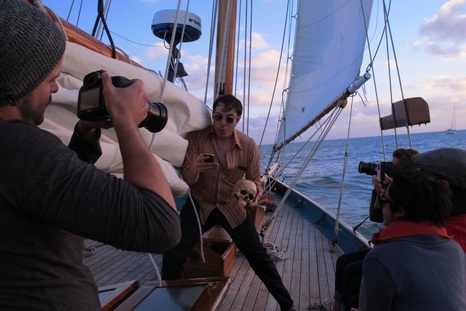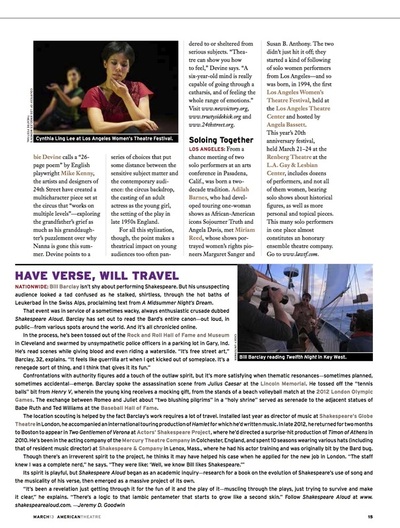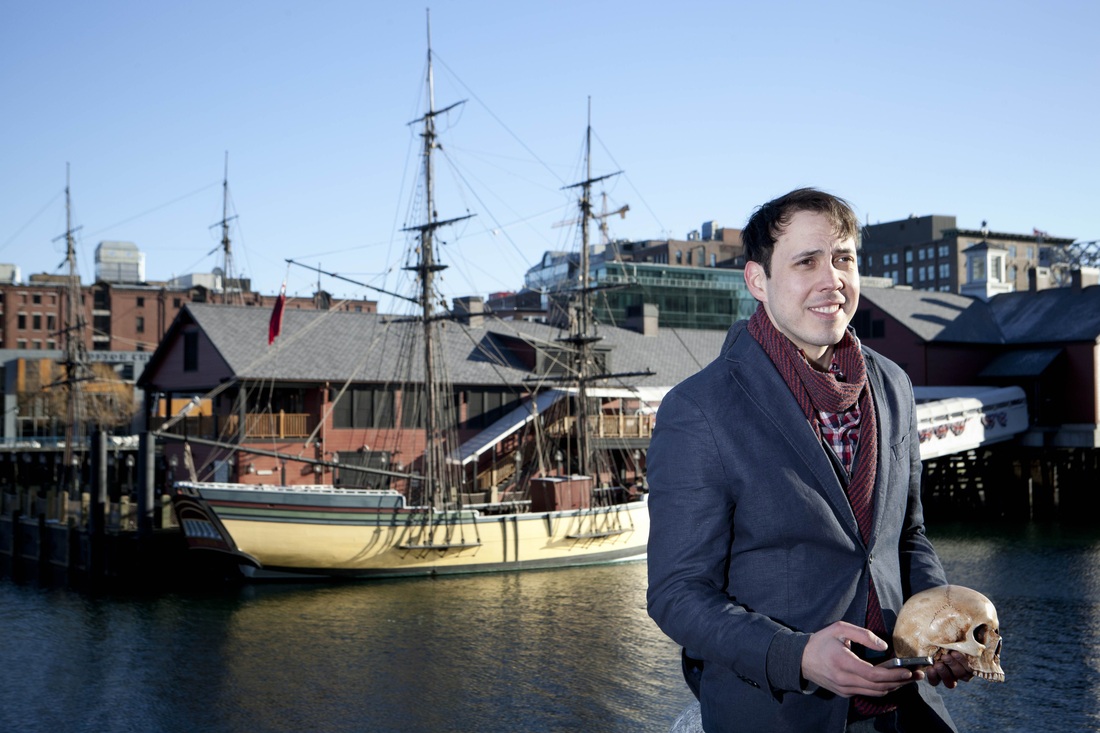"Have Verse, Will Travel"
Published in American Theatre, March 2013

Barclay reads from "Twelfth Night" off the coast of Key West. Photo: Casey Unterman
Bill Barclay isn’t shy about performing Shakespeare. But his unsuspecting audience looked a tad confused as he stalked, shirtless, through the hot baths of Leukerbad in the Swiss Alps, proclaiming text from A Midsummer Night’s Dream.
That event was in service of a sometimes wacky, always enthusiastic crusade dubbed Shakespeare Aloud. Barclay has set out to read the Bard’s entire canon—out loud, in public—from various spots around the world. And it’s all chronicled online.
In the process, he’s been tossed out of the Rock and Roll Hall of Fame and Museum in Cleveland and swarmed by unsympathetic police officers in a parking lot in Gary, Ind. He’s read scenes while giving blood and even riding a waterslide. “It’s free street art,” Barclay, 32, explains. “It feels like guerrilla art when I get kicked out of someplace. It’s a renegade sort of thing, and I think that gives it its fun.”
Confrontations with authority figures add a touch of the outlaw spirit, but it’s more satisfying when thematic resonances—sometimes planned, sometimes accidental—emerge. Barclay spoke the assassination scene from Julius Caesar at the Lincoln Memorial. He tossed off the “tennis balls” bit from Henry V, wherein the young king receives a mocking gift, from the stands of a beach volleyball match at the 2012 London Olympic Games. The exchange between Romeo and Juliet about “two blushing pilgrims” in a “holy shrine” served as serenade to the adjacent statues of Babe Ruth and Ted Williams at the Baseball Hall of Fame.
That event was in service of a sometimes wacky, always enthusiastic crusade dubbed Shakespeare Aloud. Barclay has set out to read the Bard’s entire canon—out loud, in public—from various spots around the world. And it’s all chronicled online.
In the process, he’s been tossed out of the Rock and Roll Hall of Fame and Museum in Cleveland and swarmed by unsympathetic police officers in a parking lot in Gary, Ind. He’s read scenes while giving blood and even riding a waterslide. “It’s free street art,” Barclay, 32, explains. “It feels like guerrilla art when I get kicked out of someplace. It’s a renegade sort of thing, and I think that gives it its fun.”
Confrontations with authority figures add a touch of the outlaw spirit, but it’s more satisfying when thematic resonances—sometimes planned, sometimes accidental—emerge. Barclay spoke the assassination scene from Julius Caesar at the Lincoln Memorial. He tossed off the “tennis balls” bit from Henry V, wherein the young king receives a mocking gift, from the stands of a beach volleyball match at the 2012 London Olympic Games. The exchange between Romeo and Juliet about “two blushing pilgrims” in a “holy shrine” served as serenade to the adjacent statues of Babe Ruth and Ted Williams at the Baseball Hall of Fame.

The location scouting is helped by the fact Barclay’s work requires a lot of travel. Installed last year as director of music at Shakespeare’s Globe Theatre in London, he accompanied an international touring production of Hamlet for which he’d written music. In late 2012, he returned for two months to Boston to appear in Two Gentlemen of Verona at Actors’ Shakespeare Project, where he’d directed a surprise-hit production of Timon of Athens in 2010. He’s been in the acting company of the Mercury Theatre Company in Colchester, England, and spent 10 seasons wearing various hats (including that of resident music director) at Shakespeare & Company in Lenox, Mass., where he had his actor training and was originally bit by the Bard bug.
Though there’s an irreverent spirit to the project, he thinks it may have helped his case when he applied for the new job in London. “The staff knew I was a complete nerd,” he says. “They were like: ‘Well, we know Bill likes Shakespeare.’”
Its spirit is playful, but Shakespeare Aloud began as an academic inquiry—research for a book on the evolution of Shakespeare’s use of song and the musicality of his verse—then emerged as a massive project of its own.
“It’s been a revelation just getting through it for the fun of it and the play of it—muscling through the plays, just trying to survive and make it clear,” he explains. “There’s a logic to that iambic pentameter that starts to grow like a second skin.” Follow Shakespeare Aloud at www. shakespearealoud.com. —Jeremy D. Goodwin
Though there’s an irreverent spirit to the project, he thinks it may have helped his case when he applied for the new job in London. “The staff knew I was a complete nerd,” he says. “They were like: ‘Well, we know Bill likes Shakespeare.’”
Its spirit is playful, but Shakespeare Aloud began as an academic inquiry—research for a book on the evolution of Shakespeare’s use of song and the musicality of his verse—then emerged as a massive project of its own.
“It’s been a revelation just getting through it for the fun of it and the play of it—muscling through the plays, just trying to survive and make it clear,” he explains. “There’s a logic to that iambic pentameter that starts to grow like a second skin.” Follow Shakespeare Aloud at www. shakespearealoud.com. —Jeremy D. Goodwin

